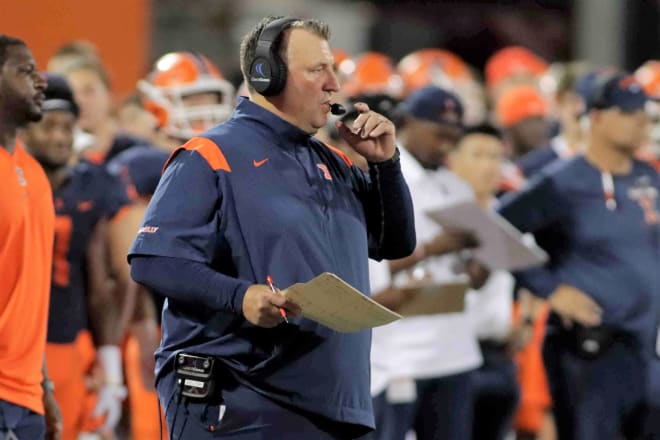Supinie: Illini have much to prove in Bret Bielema's second season
CHAMPAIGN – In his first year of the job, Illinois football coach Bret Bielema almost performed a miracle.
After taking over program found toward the bottom of the Big Ten Conference hierarchy, Bielema overcame a slow start, showed a pulse with three eye-opening conference wins, and nearly shoved the Illini into bowl season.
Even from the most pessimistic Illini fan who has been through this “rebuild’’ every five or six seasons for a lifetime, there was no denying considerable progress made. In his second year, Bielema still faces some of the same challenges.
College football is all about hope and momentum. Without it, any program finds it difficult to recruit, raise money and sell tickets. It’s simple: win, throw money in the NIL bag, recruit a few studs, sell more tickets. Wash. Rinse. Repeat.

But as the Illini and Bielema head into this second season of their marriage, Illinois finds itself ranked sixth in the seven-team Big Ten West by many preseason magazines. There’s little respect for the Illini after knocking off Nebraska to start the season a year ago, upsetting Penn State in Happy Valley and defeating division rival Minnesota. Illinois also lost four games by one score.
Like many of us inside the state lines, those folks putting together the preseason picks also realize the Illini have plenty to prove.
Getting over the hump – and that means getting into a bowl game for the first time since 2019 – requires more from an offense that was so disappointing it got coordinator Tony Petersen fired in his first season with the program. Bielema showed he wasn’t messing around, because this might be his last chance at a Power 5 job.
A year ago, the Illini returned a starting quarterback, an experienced line and a loaded backfield. Sure, the Illini were thin at wide receiver, but they expected to get the ball to Isaiah Williams, the slot receiver who graciously gave up his desire to play quarterback.
The Illini averaged only 20.2 points per game, easily ranking in the bottom third of the league. The offense and suffered from a lack of creativity in finding ways to get Williams the ball.
The biggest addition to the offense is Barry Lunney Jr., the new hire. If Petersen was a journeyman, Lunney is a rising star, and the program is betting big on his scheme to balance the run and pass while also turning up the tempo. He has some pieces. Durable Chase Brown and bruiser Josh McCray are the backbone of the offense – especially if the Illini can find three reliable starters to fill holes on the offensive line -- but Lunney earns his pay by coaxing a passing game from a program that ranked last in the league a year ago.
Syracuse transfer Tommy DeVito is the likely starter, although Art Sitkowski’s erratic passing last season might be blamed on a shoulder that required surgery. No matter, the biggest issue could be getting the ball to Williams, the team’s best playmaker, and perhaps to Luke Ford, the heralded tight end who has matured under the new coaching staff.
The transition to an up-tempo offense hasn’t overwhelmed the Illini, Lunney said, because a bulk of the roster has experience with it in college or high school ball.
Fall camp “will be really critical to put the polish on that,’’ Lunney said. “Guys are working hard on it this summer.’’
Defensive coordinator Ryan Walters oversaw the greatest improvement in the program last season, directing a unit that trimmed points allowed from 34.9 in 2020 to 21.9 in 2021. Give the man a raise. He lost Kerby Joseph to the NFL Draft and will need to find key replacements on the line, but there’s the feeling Walters has already proven himself.
The Illini need playmakers, especially at outside linebacker, but Walters didn’t appear nervous.
“I actually feel like we’re deeper than a year ago, but we haven’t played a down yet,’’ Walters said. “The departure of Kerby was a good one. He did what he’s supposed to do. He deserved to go in the top three rounds of the draft. It’s other guys’ turn to step up. Having another year in the system and being confident heading into the season, we should be able to have similar production as a whole.’’
Bielema likes the schedule overall with the spacing of two open dates thanks to the week zero opener against Wyoming, but the addition of Michigan State, Michigan, and Indiana to the mix (goodbye, Rutgers) makes the climb even more uphill in Bielema’s second campaign.
Momentum?
It might be a chore to match last year’s 5-7 record. If the Illini can overhaul an underperforming offense, the Illinois should be in the mix for a bowl game. That means a fast start for Lunney and his crew, because the Illini want to pad the win column in games against Wyoming, Indiana, Virginia and Chattanooga.
Then comes the meat of the schedule.
But as Bielema puts this program together, the first peek into the future is getting a read on Lunney. If he can make a similar impact this season made by Walters on his side of the ball last season, there’s no reason the Illini can’t contend for six wins and a bowl berth.
So even if the national writers think the Illini are bottom feeders in the weakest division in the bloated Big Ten, the Illini are an unheralded pick to overachieve. Finding five wins on that schedule might be hard.
If Lunney produces, it gets easier to find five and maybe six.